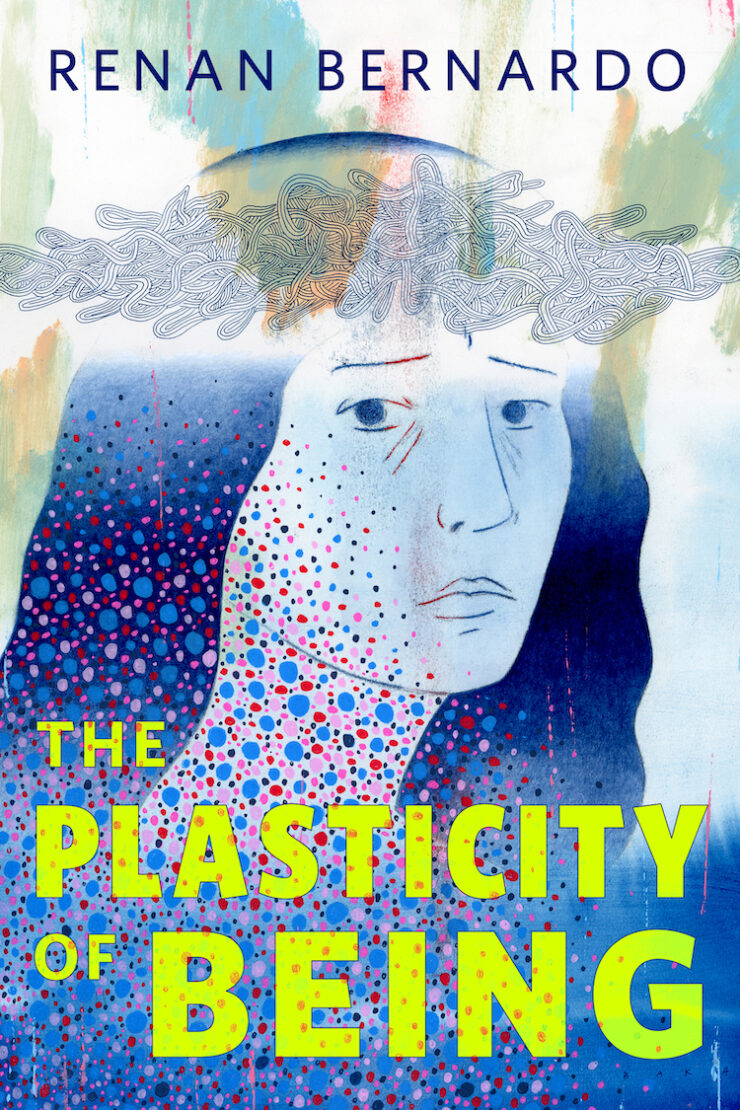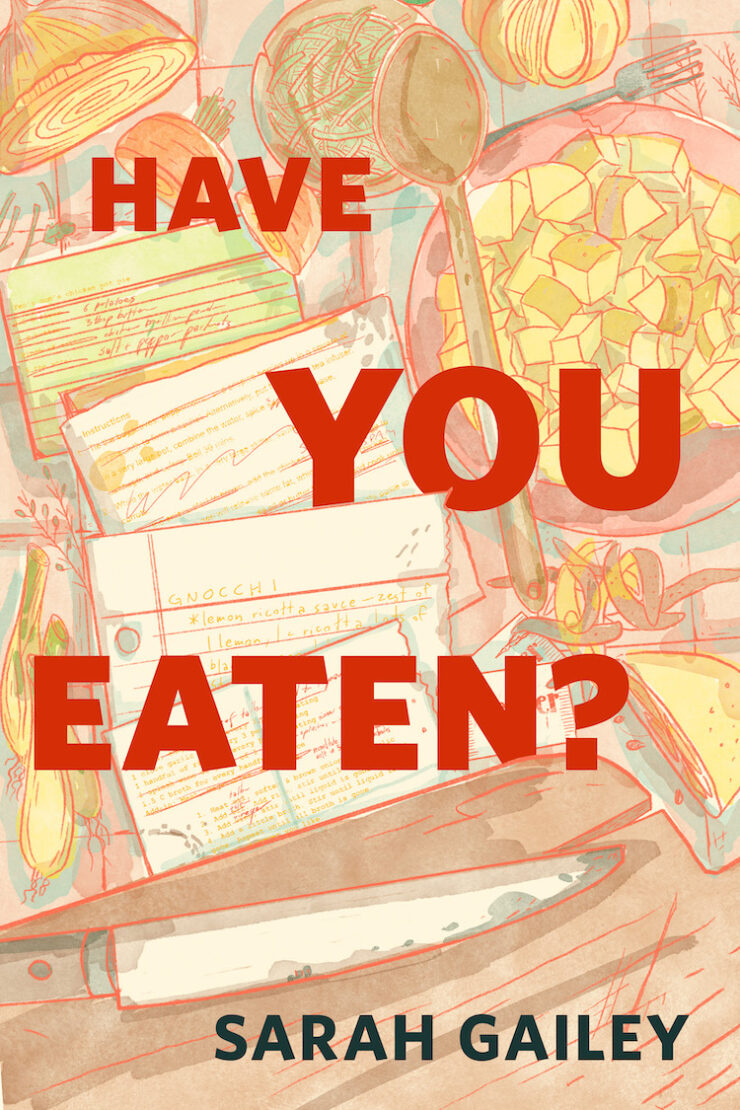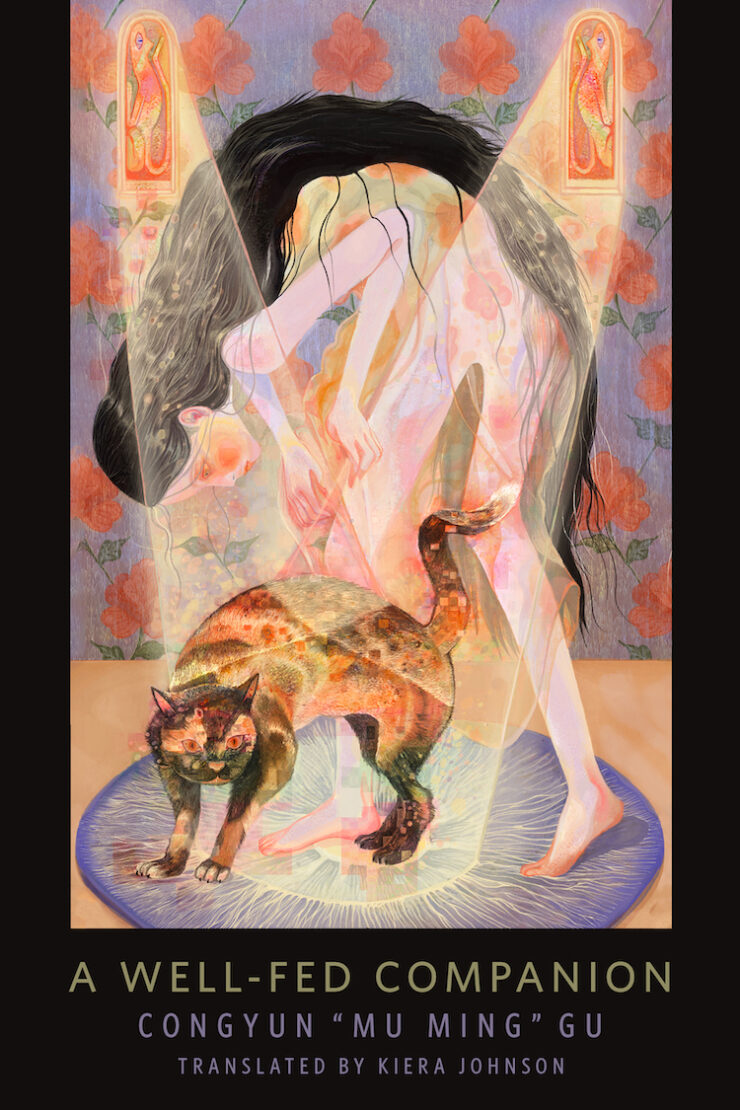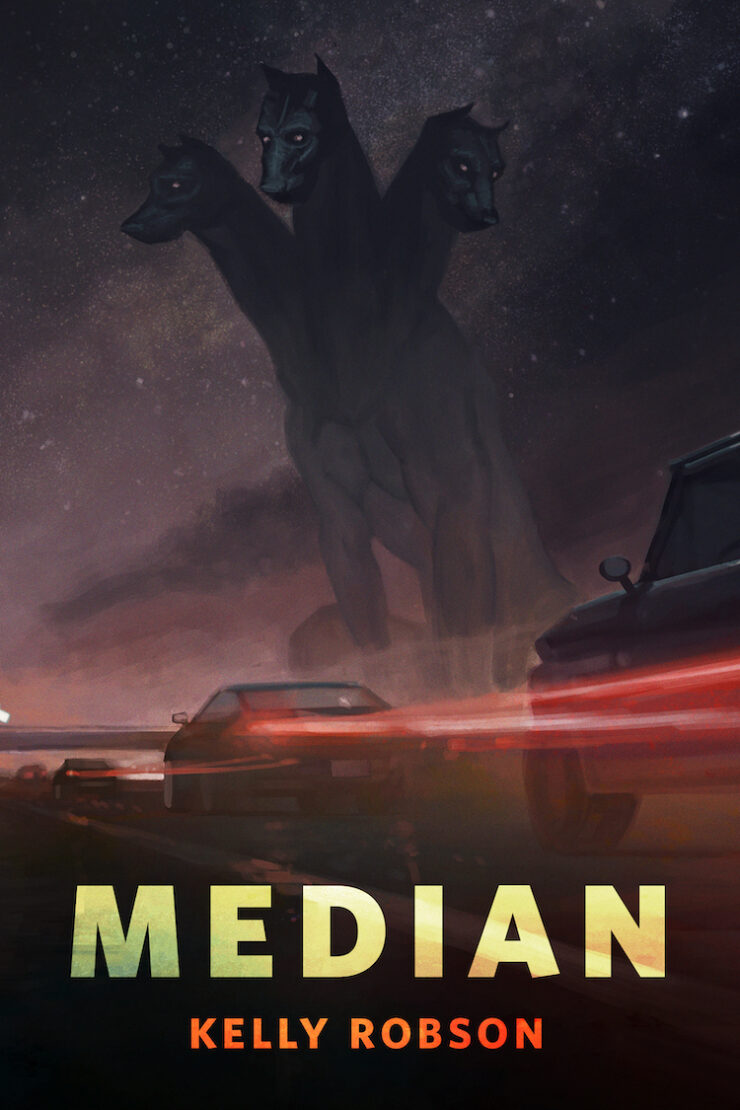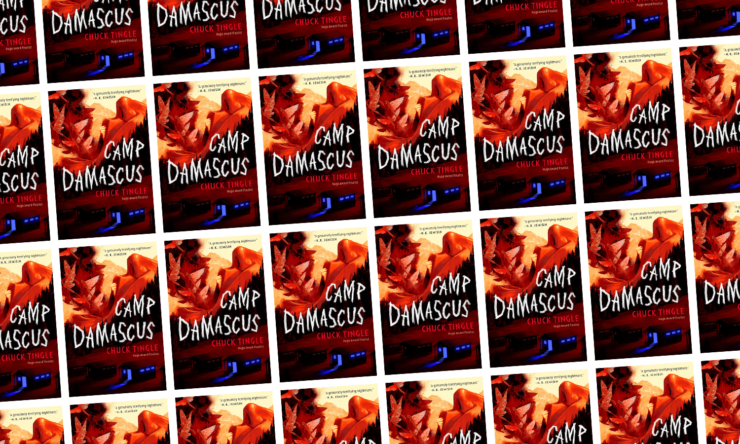I LOVE THIS BOOK.
Sorry if this is unprofessional of me, to scream my thoughtfully considered book critic’s opinion in your face, but: I LOVE THIS BOOK.
If you only know Chuck Tingle from his erotica you might think that this book is a gag, but it’s not—and the erotica isn’t either, really. Camp Damascus, like all of Tingle’s books, is about the power of love to transform life into a magical journey, if only we embrace it—and if only the oppressive forces of society will get out of our way. In his latest book, Tingle creates a work of small-town queer horror that balances the joy of found family and young romance with the terrors both supernatural and banal. There’s also a lot of humor to be found in Camp Damascus, but the horror is very real and very horrific—it’s just that most of it happens at the hands of the God-fearing people of Neverton, Montana, not any supernatural element.
Rose Darling is about to graduate from high school. She’s a little older than some of the other kids, because she’s part of a fundamentalist church called The Kingdom of The Pine that has its younger members do a few dedicated years of service work scattered across their teens. Rose loves being a member of the Kingdom. She knows a Bible verse for every occasion, she knows that the only real superhero is Jesus, and she knows that the Kingdom’s Camp Damascus, the “most effective ex-gay ministry on the planet” has a 100% success rate.
She loves her parents, her father’s groan-worthy dad jokes, and her tradition of taking quiet walks through the neighborhood with her mom. She loves science and can’t wait to head off to college to learn more. But her parents seem far more invested in her friendship with a boy named Isaiah than in her plans for her future. And her dad, especially, seems to be weary of her irrepressible curiosity. For instance, when she suddenly vomits up mouthfuls of flies—“A dark porridge of living creatures”—at dinner? She is, understandably, curious about how and why that could possibly happen. But her parents just laugh and insist she must have swallowed some larvae while she swimming. With Isaiah. How did that go, anyway?
Buy the Book
Camp Damascus
Rose’s hunt for the truth about the flies leads to a lot of truths about the Kingdom, her pastor, the friendly, suspiciously hale Pete Bend, and her therapist Dr. Smith. There is a dark, complicated cosmology writhing beneath the surface of Neverton, but to say much more would spoil the fun of the book.
Tingle’s characters are all fantastic, and I say “all” because everyone, from Rose’s parents to that therapist to the friends Rose makes along her way to the smallest walk-on characters, are made three-dimensional and real. I point this out because I think Tingle is making a subtle point that everyone in the book has their own journey and story. All of them are important, and the choices they each make as they learn the truth are vital. It takes a whole community to support something like Camp Damascus—whether it’s people volunteering as camp counselors or people from the more secular areas of town who are willing to look the other way while Neverton reaps the profits.
Tingle’s evocation of a closed religious world is perfect. The Kingdom of the Pine has created a perfect little pocket universe that slides alongside the secular world: the Kingdom kids go to public school, they go to parties where “terror films” play on the TV while kids play Truth or Dare and Seven Minutes in Heaven, they join in the senior class ritual of jumping off a cliff into the lake below. It’s just that they also know they have to abide by The Four Precepts (handed down by Prophet Tobias Cobel), and when they’re about to jump they might recite “the Lord is my light and my salvation” on the way down, while the other kids scream “FUCK!”
But about those Tenets:
Respect—I will honor when I do not understand.
Integrity—I will believe when I do not witness.
Service—I will strive when my sin is heavy.
Excellence—I will persevere when my body does not.
It’s a perfect formulation. The Tenets sound reasonable on the surface, but the moment you start to pull any thread you see how they can be used as shackles. When Rose tries to ask her father or her therapist basic questions about her own health, she’s told to “Respect” them by obeying Tenet 1. How can you develop your natural curiosity and critical thinking skills when you’re in constant state of striving against sin? That’s really gonna take up your whole day. And as for “Excellence”—well, I’ll let Rose’s father exegete that one: “’To live on,’ Dad continues. ‘That could mean your spirit ascends to heaven, or a business you’ve built keeps turning a profit. It could also mean your family line lives on.’”
That’s a handy Tenet, when it can refer to spiritual transcendence, or succeeding at capitalism or dedicating your life to the production of children! It really covers all the bases. And given that Luke Darling cites this particular one as he’s telling his daughter how much the good Christian boy down the street likes her, and that it’s in response to Rose wanting to focus on school, not dating, the reader is left to draw an obvious conclusion of the message Rose is meant to absorb.
When I was a kid, one of the few rituals I had was a weekly walk with my mom to a convenience store. She would buy lotto tickets, I would occasionally get some sort of candy bar. On the way there and back again, sometimes we’d talk and sometimes we wouldn’t. These walks were Good for three reasons: they happened on Friday night, when the whole weekend stretched before me like a predator-free savannah; they happened at NIGHT, so the effects of life in Florida were slightly mitigated; and they were… calm? chill? This was not the point when my mother would spring anything important on me—those conversations were reserved for the car. If I wanted to complain about stuff from school I could do that, but the tone on these walks tended to ward against bitch sessions. A lot of the walk would just be the two of us enjoying the slightly cooler air, the salt off the Gulf, the stars that tried to compete with streetlight’s haloing out in the humidity.
Rose and her mother also go for walks around their neighborhood. And for a moment, reading it, I saw me and my mom—but their walks are not chill. Within a few steps of their house, Lisa Darling is quizzing her daughter, pointing to each of their neighbor’s and proposing hypothetical sins that are taking place within. (Never mind that even doing that is itself…well, whatever, I’m not Lisa Darling’s keeper.) Rose’s job is to cough up the Bible verse that is most likely to diagnose the soul-sickness within, along with a proper course of counseling or service work that will get these fictional sinners right with the Lord.
Or at least, right with Rose’s mom and dad, and Pastor Bend.
This is a concise, chilling way to show a whole lotta kinds of perversion, no? A moment of bonding between mother and daughter turned into a high-stakes test; a home turned into a den of iniquity; dozens of stones being thrown at neighbors who are supposed to be loved; judgement being dealt out by someone who is, after all, just another flawed human; a whited sepulcher being built right there on the suburban street. At its heart, the scene does what the whole book does: it takes something that should be a ritual filled with love and warps it.
Now the good folks at Kingdom of The Pine would contend that it’s these pesky queers who warp love, right? Pastor Bend’s latest self-help book is even titled Love Right. But if that’s the case then why are the only people who act with real love and selflessness in the book gay as hell? It’s an ineffable dang mystery, is what it is.
But the best thing—well, wait, there are at least two best things in Camp Damascus, I think, and those two things are queerness and neurodivergence.
Rose is a neurodivergent hero.
Hang on, let me say that again. Rose is a neurodivergent hero. Meaning, it is her neurodivergence that helps her act heroically. She is resourceful, tenacious, has an enormous capacity for research, and an unquenchable curiosity. Her particular thought patterns—which are as furiously rebuked by her family as her queerness—are what lead her to noticing her community’s dark secrets, and they allow her to fight evil when it inevitably rears its ugly head.
The other thing is how beautifully queer it is. I suppose that seems obvious, given that it’s about a “conversion” camp, but I think what I’m trying to get at is that that the Kingdom of The Pine is a one issue voter. They’ve latched onto the idea that queerness is evil and needs to be eradicated from people at any cost. And while, yes, they’re making BANK from their camp’s “success” rate, if they were just grifters the horror wouldn’t be so effective. They genuinely believe that they’re in a battle for the souls of the children in the camp.
This book is, itself, a shot fired in the war that’s being waged in our own, slightly less fictional world. The IRL analogues of the Kingdom of The Pine are everywhere, stronger every day, or at least louder, and far scarier than anything in Camp Damascus.
This book uses love and humor as its weapons, and it’s a classic way to fight that army of dour, sour-faced, stunted, gnarled, nubs of human potential who twist in endlessly on themselves murmuring into their own ears that they, alone, are right, righteous, correct in the eyes of god, that they are the ones oppressed by a society created by devils to tempt them, that their worldview is under attack from all sides despite being the dominant cultural force in this country and about half the world, despite being the absolute fulcrum at the center of mainstream western culture, art, literature, legal precedent—and at least thirty years of JRPGs.
And I think it’s important to note how Camp Damascus fights. It’s scary, sure, but it’s funny. It’s kind. Characters who are abused find people who support them. Some of the characters who barely survive the spiritual abuses of their church find salvation in a rejection of belief. Others find paths that lead them to a version of God who doesn’t have much in common with the Kingdom of the Pine’s version, and these characters are all the stronger in their faith. None of these characters are “right”—they all simply have different ways of life, and they respect each other’s. The way they fight in the book, is with art, music, scientific experimentation, creativity, trust. The way the book fights is with the reassurance, page by page, that everyone in the book is worthy of love—but also that those who force their wills on others will meet consequences. Some pretty gnarly consequences, in fact.
Every day I get up and make myself believe that this will be enough that someday it will be art and laughter and love that pull humanity back from the brink of extinction, oppression, totalitarianism, theocracy. I know, logically, that every day some of us are pulled back just as others fall. We’re locked in this event horizon together.
Will love and humor be enough, in the end?
Can anything fight the void?
Here is what I know: this book has been finding people who need it, and it will continue to do so. It is a fun, spooky horror novel. If you, like me, are fortunate enough to live somewhere (so far, kind of) safe, you can read it and have a great time. If you’re a person who doesn’t need to worry about the dangers in this book, then you can read it and have a great time. But there are people out there who will take this book as I think it’s meant, as a hand reaching to pull them out of darkness. This is a fun, silly book, but it’s also a life raft, an affirmation, a defiant Yes in a world only too happy to say No, a loving “Who you are is beautiful” in a world that that is only too willing to tell you that you’re wrong, sick, broken, sinful.
I’m glad Chuck Tingle wrote Camp Damascus, and I’m glad I’m alive to read it.
Camp Damascus is published by Nightfire.
Read an excerpt here.


